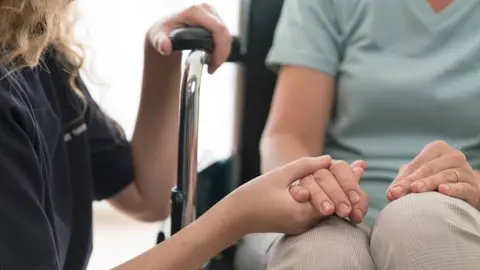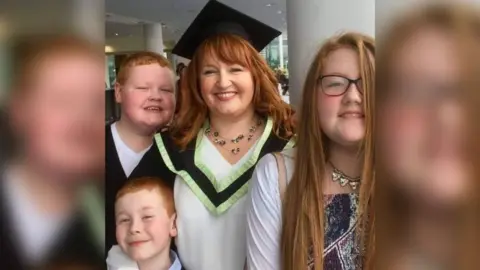Unpaid carers being left in debt, hardship and fear - new commission chair
 Getty Images
Getty ImagesA new commission, led by the charity Carers NI, will spend the next 12 months gathering evidence from local households in an effort to tackle financial hardship among unpaid carers.
The Carer Poverty Commission's recommendations will inform future policy at Stormont.
There are about 300,000 carers in Northern Ireland - about 50,000 receive a weekly allowance of £69.70.
The commission's chair said carers are being "left in debt and fear".
"Nearly one in four last year were having to cut back on essentials like food and heating," Helen Barnard told BBC's Good Morning Ulster programme.
"We've literally got carers today who are sitting in the dark, who are going hungry, who are weighing up can they afford the fuel to get to medical appointments."
'Racking up debt'
Ms Barnard said the level of hardship for carers is far greater than other groups as they face higher overheads, such as running specialist medical equipment.
"The level of support that carers get simply doesn't match what you need to get by," she said.
A 2022 review commissioned by the Department for Communities found that without unpaid carers the "health and social care system would collapse".
Carers NI said that a fifth of carers are now relying on credit cards and overdrafts, with more than a quarter experiencing poor mental health.
"People are racking up debt just to try and keep up with the cost of living... the level of hardship we are seeing for carers is worse than we see for most other groups," Ms Barnard added.
"You can't just go out and get a job because you need to care for the person you're responsible for."
 Orla Fitzsimons
Orla FitzsimonsOrla Fitzsimons has three children, one of which has learning difficulties and complex mental health issues - as a 'parent carer' she receives no financial support and had to give up a well-paid job in the health service 10 years ago.
She told Good Morning Ulster that caring responsibilities and financial worries have had a significant impact on her mental health, which in turn has created a "real barrier" to returning to employment.
"There's no that way I can improve the financial situation of my family unless I'm working," the mother-of-three from Downpatrick, County Down said.
Ms Fitzsimons has welcomed the commission's launch, as she feels that carers' contributions are inadequately rewarded, both financially and through respite support.
"Work of the Carer Poverty Commission really critical to designing policy solutions, to better support all unpaid carers financially and to begin to actually make visible and identify and tackle the unacceptable levels of carer poverty in Northern Ireland," she said.
"[The research is] very important, it will begin to identify first of all for the Northern Ireland Executive what needs to be done to help.
"We're basically invisible and we're not getting any support in doing that - we're holding the health service up," she added.
